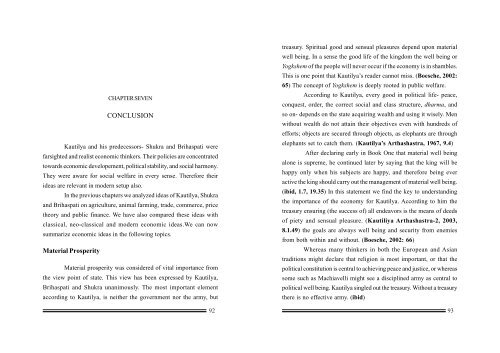Economics of Kautiliya Shukra and Brihaspati.pmd
Economics of Kautiliya Shukra and Brihaspati.pmd
Economics of Kautiliya Shukra and Brihaspati.pmd
Create successful ePaper yourself
Turn your PDF publications into a flip-book with our unique Google optimized e-Paper software.
CHAPTER SEVEN<br />
CONCLUSION<br />
Kautilya <strong>and</strong> his predecessors- <strong>Shukra</strong> <strong>and</strong> <strong>Brihaspati</strong> were<br />
farsighted <strong>and</strong> realist economic thinkers. Their policies are concentrated<br />
towards economic developement, political stability, <strong>and</strong> social harmony.<br />
They were aware for social welfare in every sense. Therefore their<br />
ideas are relevant in modern setup also.<br />
In the previous chapters we analyzed ideas <strong>of</strong> Kautilya, <strong>Shukra</strong><br />
<strong>and</strong> <strong>Brihaspati</strong> on agriculture, animal farming, trade, commerce, price<br />
theory <strong>and</strong> public finance. We have also compared these ideas with<br />
classical, neo-classical <strong>and</strong> modern economic ideas.We can now<br />
summarize economic ideas in the following topics.<br />
Material Prosperity<br />
Material prosperity was considered <strong>of</strong> vital importance from<br />
the view point <strong>of</strong> state. This view has been expressed by Kautilya,<br />
<strong>Brihaspati</strong> <strong>and</strong> <strong>Shukra</strong> unanimously. The most important element<br />
according to Kautilya, is neither the government nor the army, but<br />
treasury. Spiritual good <strong>and</strong> sensual pleasures depend upon material<br />
well being. In a sense the good life <strong>of</strong> the kingdom the well being or<br />
Yogkshem <strong>of</strong> the people will never occur if the economy is in shambles.<br />
This is one point that Kautilya’s reader cannot miss. (Boesche, 2002:<br />
65) The concept <strong>of</strong> Yogkshem is deeply rooted in public welfare.<br />
According to Kautilya, every good in political life- peace,<br />
conquest, order, the correct social <strong>and</strong> class structure, dharma, <strong>and</strong><br />
so on- depends on the state acquiring wealth <strong>and</strong> using it wisely. Men<br />
without wealth do not attain their objectives even with hundreds <strong>of</strong><br />
efforts; objects are secured through objects, as elephants are through<br />
elephants set to catch them. (Kautilya’s Arthashastra, 1967, 9.4)<br />
After declaring early in Book One that material well being<br />
alone is supreme, he continued later by saying that the king will be<br />
happy only when his subjects are happy, <strong>and</strong> therefore being ever<br />
active the king should carry out the management <strong>of</strong> material well being.<br />
(ibid, 1.7, 19.35) In this statement we find the key to underst<strong>and</strong>ing<br />
the importance <strong>of</strong> the economy for Kautilya. According to him the<br />
treasury ensuring (the success <strong>of</strong>) all endeavors is the means <strong>of</strong> deeds<br />
<strong>of</strong> piety <strong>and</strong> sensual pleasure. (<strong>Kautiliya</strong> Arthashastra-2, 2003,<br />
8.1.49) the goals are always well being <strong>and</strong> security from enemies<br />
from both within <strong>and</strong> without. (Boesche, 2002: 66)<br />
Whereas many thinkers in both the European <strong>and</strong> Asian<br />
traditions might declare that religion is most important, or that the<br />
political constitution is central to achieving peace <strong>and</strong> justice, or whereas<br />
some such as Machiavelli might see a disciplined army as central to<br />
political well being. Kautilya singled out the treasury. Without a treasury<br />
there is no effective army. (ibid)<br />
92 93


